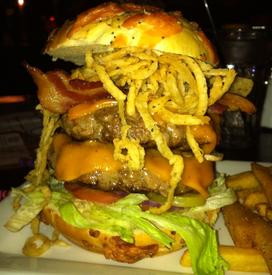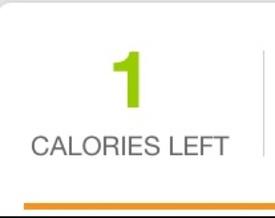going over in protein
Options

saraannefrazer
Posts: 66 Member
I Keep going over my protein goal for the day. Ids this going to effect anything and is it bad?
0
Replies
-
Going over in protein is generally not a bad thing as your body tends to turn less of that into fat as compared to say carbohydrates. Protein is also important in maintaining muscle mass. If you're keeping your body in a calorie defecit, I would argue that it's even more important to eat protein and weight train because you can lose muscle as well as fat. I typically go over my protein as it is set up on here. I do feel that there is a bit of a bias towards carbs in the settings and my diet is more protein-orientated. I've dropped about 60lbs since last December and was experiencing my most dramatic weight loss when I focused on reducing simple carbs and sodium in my diet.0
-
I think MFPs protein goal is really really low. I was going over it without even trying. Now after seeing interesting comments on here relating to muscle mass, now I shoot for around 100g protein per day. My goal is only 45 before exercise. I just think that's really low. 2 chicken breasts takes care of that 'requirement' for the day and I just think I need more than that.0
-
Correct me if I'm wrong, I'm not a dietician but I'm pretty sure as well that your body can only process something like 30g of protein at a time, the rest goes to waste. If you're looking to maximize the effects of including a lot of protein, eat the ~30g portions at intervals over the course of your day, as opposed to eating 60g in one sitting (like I did tonight lol). Also, don't forget about other great sources of protein. Some of my favourites are cottage cheese, almonds, yogurt, and pumpkin seeds.0
-
ahh thankyou!0
-
I agree. I go over on the protein every day. Way over. I found on another diet (one that worked when I stuck to it but I couldn't keep it up) that it helps me to have protein at most every meal. I stay full longer and it is one piece in warding off depression.0
-
Going over in protein is generally not a bad thing as your body tends to turn less of that into fat as compared to say carbohydrates. Protein is also important in maintaining muscle mass. If you're keeping your body in a calorie defecit, I would argue that it's even more important to eat protein and weight train because you can lose muscle as well as fat. I typically go over my protein as it is set up on here. I do feel that there is a bit of a bias towards carbs in the settings and my diet is more protein-orientated. I've dropped about 60lbs since last December and was experiencing my most dramatic weight loss when I focused on reducing simple carbs and sodium in my diet.
I agree! I go over on protien & fiber on a daily basis. But both of those are crucial to weight loss & can actually benefit your weight loss goals. Protien is harder to digest because of its density, so it actuallly uses more energy (ie. calories) to metabolize it. Protien also builds & maintains muscle mass (like he said) which is really important in your health efforts. Fiber helps you poop! The more bad stuff that leaves your body, the less bloated and heavy you will be. Fiber is very effective in weight loss because it helps clear out the bowel more eficiently & prevents colon cancer. Sorry, I know its gross
If you have any more questions, feel free to message/add me! I'm an exercise science major with a minor in food science so I know alot about this stuff. Don't hesitate :-)0 -
Studies generally support more protein rather than less in training scenarios and other studies indicate that protein increases the metabolic rate of digestion.
It is a myth that a human can only utilize a certain amount of protein at a sitting: man as a species would not have survived if their body could not process food as it became available. While the body digests about 10 grams of protein per hour and may take a longer time to process 60 grams of protein from a meal than 15 grams, it is all digested and not stored as "fat" or "wasted". As a matter of fact, the body does not use as much protein during periods of physical exercise as it does in the hours (some research supports up to 72 hours) after the physical exercise, when the body is at rest.
MacDougall JD, Gibala MJ, Tarnopolsky MA, MacDonald JR, Interisano SA,
Yarasheski KE.
The time course for elevated muscle protein synthesis following heavy resistance
exercise. Can J Appl Physiol. 1995;20(4):480-6.
Chesley A, MacDougall JD, Tarnopolsky MA, Atkinson SA, Smith K.
Changes in human muscle protein synthesis after resistance exercise.
J Appl Physiol. 1992;73(4):1383-8.
Phillips SM, Tipton KD, Aarsland A, Wolf SE, Wolfe RR.
Mixed muscle protein synthesis and breakdown after resistance exercise in humans.
Am J Physiol. 1997;273(1 Pt 1):E99-107.
Protein intake may positively affect body composition. Since all food requires
metabolic processing, all macronutrients increase metabolism. However, the
metabolic increases seen when eating protein are double those seen when eating
carbohydrates or fat. Therefore a high protein intake may in fact be thermogenic
and may lead to increased calorie burning and fat loss.
During dieting, this may enhance calorie expenditure and therefore the rate of
fat loss
Blacklevin et al. 1975, Ballor and Poehllman 1994, Skov et al. 1999,
Alford et al. 1990.0
This discussion has been closed.
Categories
- All Categories
- 1.4M Health, Wellness and Goals
- 396.8K Introduce Yourself
- 44.2K Getting Started
- 260.9K Health and Weight Loss
- 176.3K Food and Nutrition
- 47.6K Recipes
- 232.8K Fitness and Exercise
- 451 Sleep, Mindfulness and Overall Wellness
- 6.5K Goal: Maintaining Weight
- 8.7K Goal: Gaining Weight and Body Building
- 153.3K Motivation and Support
- 8.3K Challenges
- 1.3K Debate Club
- 96.5K Chit-Chat
- 2.6K Fun and Games
- 4.5K MyFitnessPal Information
- 16 News and Announcements
- 18 MyFitnessPal Academy
- 1.4K Feature Suggestions and Ideas
- 3.1K MyFitnessPal Tech Support Questions




